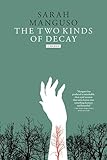

 I had the great pleasure of reading Sarah Manguso’s memoir The Two Kinds of Decay, a spare, unsentimental account of her fight against a rare autoimmune disorder. Manguso brings to the memoir a poet’s attention to line breaks and white space, which amplify the chilling juxtapositions and naked declarations of her monumental physical struggle. It’s a rare form for the memoir, one that perfectly suits its subject.
I had the great pleasure of reading Sarah Manguso’s memoir The Two Kinds of Decay, a spare, unsentimental account of her fight against a rare autoimmune disorder. Manguso brings to the memoir a poet’s attention to line breaks and white space, which amplify the chilling juxtapositions and naked declarations of her monumental physical struggle. It’s a rare form for the memoir, one that perfectly suits its subject.
Holly Goddard-Jones wrote a sad, dark, honest-spoken collection of stories called Girl Trouble, set in rural Kentucky—all eight of them 80-proof and among my favorites of the year.
And I’ve just finished the lion’s share of essays in Zadie Smith’s collection Changing My Mind. I think Smith the best critic of her generation, maybe the best mind altogether. Certainly no one has written a more loving critical appraisal of David Foster Wallace than she has in the final essay, where she makes a convincing case that Wallace’s difficulty and maddening recursion was not purposeful obfuscation, but the manifestation of his commitment to making meaningful human connection on the page.









